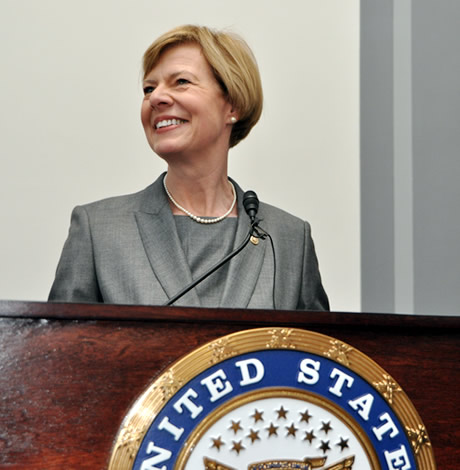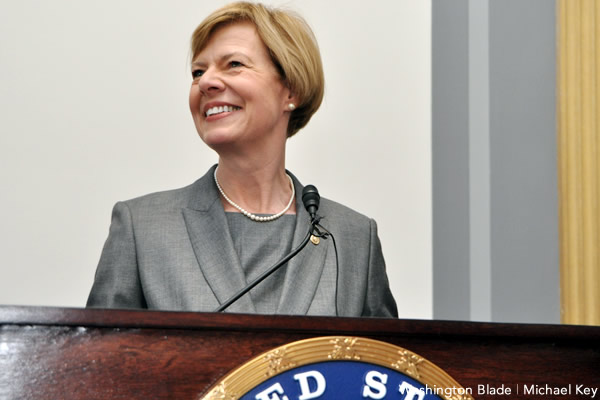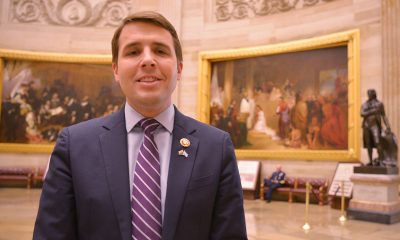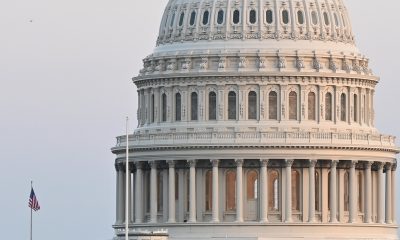News
Baldwin pledges ‘no’ vote on bill barring Syrian refugees
Lesbian senator calls on NGOs to step up efforts for LGBT asylum-seekers


Sen. Tammy Baldwin said she would vote “no” on legislation barring Syrian refugees. (Washington Blade file photo by Michael Key)
Following anger in the LGBT community over gay and bisexual members of the U.S. House voting for legislation seen to bar Syrian refugees from entering the United States, Sen. Tammy Baldwin (D-Wis.) said Thursday she’d vote “no” if the same bill came to the floor of the U.S. Senate.
Baldwin made the remarks during a panel of the Atlantic LGBT Summit titled “Unfinished Business” in D.C. in response to a question from the Washington Blade, saying, “I would vote ‘no’ on that legislation if it were to come before the Senate.”
The only out lesbian in the Senate emphasized the rigorous nature of the system for screening refugees before they enter the United States, saying it contrasts with the visa program President Obama has placed under review following the San Bernardino shootings.
“Our refugee process is the most rigorous of all the ways to get into the United States, often taking between 18 and 24 months,” Baldwin said. “Visa waiver? Another thing altogether. And so, we need to be rational and certainly not just playing the politics of the moment, or tacking it to people’s fearfulness, but we need to be informed and educated, and I can use my position in the Senate, hopefully, to educate my constituency and my colleagues to some degree.”
Baldwin also expressed confidence the need for her to vote against the legislation would never arise, saying, “I think you’ve seen what we thought was going to be an immediate reaction in the Senate to take up the House-passed bill to a real pivot in the conservation, and sort of let’s look where we need to be looking.”
The U.S. House passed the legislation, the American Security Against Foreign Enemies Act, by a vote of 289-137 last month. The bill would expand background checks on Iraqi and Syrian refugees hoping to enter the United States, but critics say the legislation would have the effect of barring them entirely.
Among those joining Republicans in voting in favor of the legislation were 47 Democrats, including Rep. Jared Polis (D-Colo.), who’s gay; Rep. Sean Patrick Maloney (D-N.Y.), who’s gay; and Rep. Kyrsten Sinema (D-Ariz.), who’s bisexual. The support of these three lawmakers for the legislation has invoked the ire of some LGBT advocates who argue members of the LGBT community should support another community facing persecution.
Anti-LGBT persecution is among the hardships refugees are fleeing from the areas controlled by ISIS. Reports have shown men perceived as gay being thrown to their death from rooftops.
Asked by the Blade after the panel whether she sees any imperative as an LGBT advocate to support Syrian refugees because they face anti-LGBT discrimination, Baldwin said “we saw this also during the Iraq war” and talked about the importance of efforts from non-governmental organizations.
“It is important to me that the international institutions that help refugees, especially with their passage through various places before there’s an ultimate determination of where they get final refugee status, that there’s a sensitivity in those NGOs as well as government-sponsored organizations to the struggles and the victimization of LGBT refugees,” Baldwin said. “Often times, that is not a priority, that’s not even on folks’ radar screens, and yet they’re a particularly vulnerable population.”
Baldwin added, “Often times, in the interim as a final refugee determination is being made, they’re in countries or locations with hostile laws, hostile customs, etc. And so, I think our international efforts have to focus on greater security, safety and protection, and frankly, knowledge and competence about LGBT issues.”
Amid calls for the Obama administration to set aside 500 slots for LGBT people among the additional 10,000 refugees anticipated from Syria, White House Press Secretary Josh Earnest said this week the administration doesn’t institute quotas for certain types of refugees, but those facing persecution like the anti-LGBT violence perpetuated by ISIS would be considered a priority for asylum cases.
Maryland
A Baltimore theater educator lost jobs at Johns Hopkins and the Kennedy Center
Tavish Forsyth concluded they could not work for Trump

BY WESLEY CASE | Tavish Forsyth had come to a conclusion: They could not work for President Donald Trump.
So the 32-year-old Baltimore resident stripped down, turned on their camera, and lit their career on fire.
“F—— Donald Trump and f—— the Kennedy Center,” a naked Forsyth, an associate artistic lead at the Washington National Opera’s Opera Institute, which is run by the Kennedy Center, said in a video that went viral. The board of the nation’s leading cultural institution had elected Trump just weeks prior as its chairman after he gutted the board of members appointed by his predecessor, President Joe Biden.
The rest of this article can be read on the Baltimore Banner’s website.
District of Columbia
Little Gay Pub to host April 25 celebration of life for Patrick Shaw
School teacher, D.C. resident praised for ‘warmth, humor, kindness’

Co-workers and friends will hold a celebration of life for highly acclaimed schoolteacher and D.C. resident Patrick Shaw beginning at 5:30 p.m. Friday, April 25 at The Little Gay Pub 1100 P St., N.W.
Little Gay Pub co-owner and Shaw’s friend, Dusty Martinez, said Shaw passed away unexpectedly on April 19 from a heart related ailment at the age of 60.
“Patrick touched so many lives with his warmth, humor, kindness, and unmistakable spark,” Martinez said. “He was a truly special soul – funny, vibrant, sassy, and full of life and we are heartbroken by his loss.”
In an Instagram posting, Shaw’s colleagues said Shaw was a second-grade special education teacher at the J.F. Cook campus of D.C.’s Mundo Verde Bilingual Public Charter School.
“Patrick brought warmth, joy, and deep commitment to Mundo Verde,” his colleagues said in their posting. “His daily Broadway sing-alongs, vibrant outfits, and genuine love for his students filled our community with energy and laughter.”
The posted message adds, “Patrick was more than a teacher; he was a light in our school, inspiring us all to show up with heart, humor, and kindness every day. His spirit will be deeply missed.”
The Washington Blade is preparing a full obituary on Patrick Shaw to be published soon.
Kenya
Kenya Red Cross-owned hotel to host anti-LGBTQ conference
Speakers from US, European countries to participate in May 12-17 gathering

Plans to host a family values meeting next month in a 5-star hotel in Nairobi that the Kenya Red Cross Society co-owns have sparked an uproar among local queer rights groups.
The groups accuse the Kenya Red Cross of violating its Global Fund commitment of protecting key populations by allowing its Boma Hotel to host an “anti-gender and anti-LGBTQ” conference.
Influential guest speakers from the U.S., the Netherlands, Spain, and Poland will preside over the Pan-African Conference on Family Values that will take place from May 12-17. The Kenyan advocacy groups say these speakers’ organizations are globally recognized for undermining LGBTQ rights.
“As the principal recipient of Global Fund in Kenya, hosting this event contradicts (the) Red Cross’s humanitarian mission and threatens the safety and dignity of people living with HIV, women and LGBTQ+ individuals, the communities that Kenya Red Cross Society has long committed to supporting,” the queer rights groups state.
The LGBTQ groups that have criticized the Kenya Red Cross include Upinde Advocates for Inclusion, the Initiative for Equality and Non-Discrimination, and Gay and Lesbian Coalition of Kenya. They have also launched an online signature collection drive to compel the Kenya Red Cross to withdraw the hotel from hosting the “Promoting and Protecting Family Values in Challenging Times”-themed conference.
“The event’s so-called ‘family values’ narrative is a smokescreen for policies that push hateful legislation and promote death, discrimination, femicide, gender-based violence, and restrict fundamental freedoms across Africa,” the groups said.
The pro-life Western organizations that are scheduled to participate in the conference include Family Watch International from the U.S., CitizenGo from Spain, the Ordo Luris Institute from Poland, Christian Council International from the Netherlands, the New York-based Center for Family and Human Rights (C-FAM), and the Foundation for American Cultural Heritage. Their local counterparts include the National Council of Churches of Kenya, the Kenya Christian Professionals Forum, the Africa Christian Professionals Forum, and the Evangelical Alliance of Kenya.
C-FAM President Austin Ruse; Family Research Council Vice President for Policy and Government Affairs Travis Wever; Global Life Campaign Executive Director Thomas W. Jacobson; and the Rev. Ricky Chelette, executive director of Living Hope Ministries, Inc., and president of the Institute of Biblical Sexuality are among the U.S. guest speakers. Other participants include Henk Jan van Schthorst, president of Christian Council International’s board of directors, Ordo Luris Institute President Jerzy Kwasniewskie and his colleague, Rafal Dorosinski, director of the group’s Legal Analysis Center.
The Kenyan groups through their online petition — “Tell Red Cross Kenya Not to Give Hate a Platform” — has so far raised more than 1,000 of the 10,000 signatures they hope to collect. The petition is addressed to Red Cross Kenya Secretary-General Ahmed Idris and his predecessor, Abbas Gullet, who is the hotel’s director.
“We call on you to immediately cancel this booking and publicly reaffirm Red Cross’ commitment to human rights, health and inclusivity,” the petition reads. “Failure to act will raise concerns about whether (the) Red Cross can still be trusted by the community to lead with empathy and fight for their rights.”
The Kenya Red Cross, however, maintains the Boma Hotel is a separate entity, even though public records indicate it is one of the facility’s shareholders.
The LGBTQ groups note the hotel should be a safe space that promotes inclusion, not platforms that enable “harmful gathering” for hate and exclusion by “dangerous groups.”
“By providing a venue for this event, Red Cross directly enables a platform for hate and discrimination — a stark contradiction to the values of inclusivity, humanity, and nondiscrimination that the organization claims to uphold,” they said.
The organizations further warn that proceeding to host the conference threatens the relationship between the Red Cross and the marginalized communities who have long depended on the humanitarian organization for support and protection. CitizenGo has nonetheless criticized the LGBTQ groups, which it describes as “radical activist groups” for “trying to silence a pro-family event” and asked the Kenya Red Cross and the Boma Hotel not to back down.
“These groups are calling the event ‘hateful’ because it affirms the natural family — marriage between a man and a woman — and the dignity of every human life, including the unborn,” Ann Kioko, the group’s campaign director for Africa and the U.N., said.
Through an online counter signature collection drive, Kioko holds CitizenGo and other groups won’t be intimidated, silenced or apologize to the queer rights groups for defending “our families, our faith and our future”.
“The real goal of these foreign-funded activist groups is to impose LGBTQ and gender ideologies on Africa — ideologies that have led elsewhere to the confusion of children, the breakdown of family structures and the rise of sexual libertinism that results in abortion, STIs and lifelong emotional and psychological trauma,” Kioko stated.
-

 Federal Government2 days ago
Federal Government2 days agoHHS to retire 988 crisis lifeline for LGBTQ youth
-

 Opinions2 days ago
Opinions2 days agoDavid Hogg’s arrogant, self-indulgent stunt
-

 District of Columbia2 days ago
District of Columbia2 days agoD.C. police seek help in identifying suspect in anti-gay threats case
-

 Opinions2 days ago
Opinions2 days agoOn Pope Francis, Opus Dei and ongoing religious intolerance












